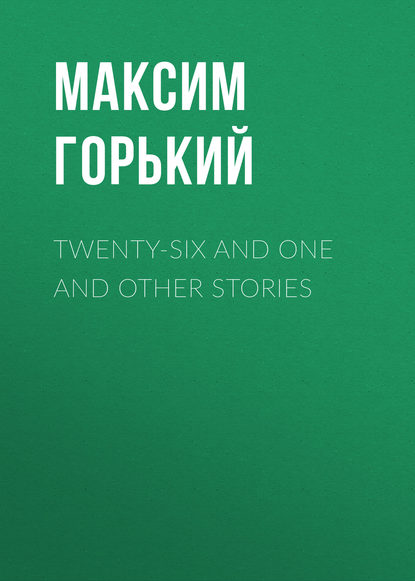По всем вопросам обращайтесь на: info@litportal.ru
(©) 2003-2024.
✖
Twenty-six and One and Other Stories
Настройки чтения
Размер шрифта
Высота строк
Поля
The rain fell. Slight at first, it soon came down thickly, heavily and came from the sky in slender streams. They crossed, forming a net that soon shut off the distance on land and water. For a long time there was nothing to be seen but the rain and this long body lying on the sand beside the sea.. But suddenly, behold Gavrilo coming from out the rain, running; he flew like a bird. He went up to Tchelkache, fell upon his knees before him, and tried to turn him over. His hand sank into a sticky liquid, warm and red. He trembled and drew back, pale and distracted.
"Get up, brother!" he whispered amid the noise of the falling rain into the ear of Tchelkache.
Tchelkache came to himself and, repulsing Gavrilo, said in a hoarse voice:
"Go away!"
"Forgive me, brother: I was tempted by the devil." continued
Gavrilo, trembling and kissing Tchelkache's hand.
"Go, go away!" growled the other.
"Absolve my sin! Friend.. forgive me!"
"Go, go to the devil!" suddenly cried out Tchelkache, sitting up on the sand. His face was pale, threatening; his clouded eyes closed as though he were very sleepy.. "What do you want, now? You've finished your business.. go! Off with you!"
He tried to kick Gavrilo, prostrated by grief, but failed, and would have fallen if Gavrilo hadn't supported him with his shoulders. Tchelkache's face was now on a level with Gavrilo's. Both were pale, wretched and terrifying.
"Fie!"
Tchelkache spat in the wide opened eyes of his employe.
The other humbly wiped them with his sleeve, and murmured:
"Do what you will.. I'll not say one word. Pardon me, in the name of Heaven!"
"Fool, you don't even know how to steal!" cried Tchelkache, contemptuously. He tore his shirt under his waistcoat and, gritting his teeth in silence, began to bandage his head.
"Have you taken the money?" he asked, at last.
"I haven't taken it, brother; I don't want it! It brings bad luck!"
Tchelkache thrust his hand into his waistcoat pocket, withdrew the package of bills, put one of them in his pocket and threw all the rest at Gavrilo.
"Take that and be off!"
"I cannot take it.. I cannot! Forgive me!"
"Take it, I tell you!" roared Tchelkache, rolling his eyes frightfully.
"Pardon me! When you have forgiven me I'll take it," timidly said
Gavrilo, falling on the wet sand at Tchelkache's feet.
"You lie, fool, you'll take it at once!" said Tchelkache, confidently, and raising his head, by a painful effort, he thrust the money before his face. "Take it, take it! You haven't worked for nothing! Don't be ashamed of having failed to assassinate a man! No one will claim anyone like me. You'll be thanked, on the contrary, when it's learned what you've done. There, take it! No one'll know what you've done and yet it deserves some reward! Here it is!"
Gavrilo saw that Tchelkache was laughing, and he felt relieved. He held the money tightly in his hand.
"Brother! Will you forgive me? Won't you do it? Say?" he supplicated tearfully.
"Little brother!" mimicked Tchelkache, rising on his tottering limbs. "Why should I pardon you? There's no occasion for it. To-day it's you, to-morrow it'll be me."
"Ah! brother, brother!" sighed Gavrilo, sorrowfully, shaking his head.
Tchelkache was standing before him, smiling strangely; the cloth wrapped around his head, gradually reddening, resembled a Turkish head-dress.
The rain fell in torrents. The sea complained dully and the waves beat angrily against the beach.
The two men were silent.
"Good-bye!" said Tchelkache, with cold irony.
He staggered, his legs trembled, and he carried his head oddly, as though he was afraid of losing it.
"Pardon me, brother!" again repeated Gavrilo.
"It's nothing!" drily replied Tchelkache, as he supported his head with his left hand and gently pulled his moustache with his right.
Gavrilo stood gazing after him until he had disappeared in the rain that still fell in fine, close drops, enveloping the steppe in a mist as impenetrable and gray as steel.
Then Gavrilo took off his wet cap, made the sign of the cross, looked at the money pressed tightly in his hand and drew a long, deep sigh; he concealed his booty in his blouse and began to walk, taking long strides, in the opposite direction to that in which Tchelkache had gone.
The sea thundered, threw great heavy waves upon the sand and broke them into foam and spray. The rain lashed the sea and land pitilessly; the wind roared. All the air around was filled with plaints, cries and dull sounds. The rain masked sea and sky..
The rain and the breaking waves soon washed away the red spot where Tchelkache had been struck to the ground; they soon effaced his footprints and those of the lad on the sand, and the lonely beach was left without the slightest trace of the little drama that had been played between these two men.
Malva
BY MAXIME GORKY
The sea laughed.
It trembled at the warm and light breath of the wind and became covered with tiny wrinkles that reflected the sun in blinding fashion and laughed at the sky with its thousands of silvery lips. In the deep space between sea and sky buzzed the deafening and joyous sound of the waves chasing each other on the flat beach of the sandy promontory. This noise and brilliancy of sunlight, reverberated a thousand times by the sea, mingled harmoniously in ceaseless and joyous agitation. The sky was glad to shine; the sea was happy to reflect the glorious light.
The wind caressed the powerful and satin-like breast of the sea, the sun heated it with its rays and it sighed as if fatigued by these ardent caresses; it filled the burning air with the salty aroma of its emanations. The green waves, coursing up the yellow sand, threw on the beach the white foam of their luxurious crests which melted with a gentle murmur, and wet it.
At intervals along the beach, scattered with shells and sea weed, were stakes of wood driven into the sand and on which hung fishing nets, drying and casting shadows as fine as cobwebs. A few large boats and a small one were drawn up beyond high-water mark, and the waves as they ran up towards them seemed as if they were calling to them. Gaffs, oars, coiled ropes, baskets and barrels lay about in disorder and amidst it all was a cabin built of yellow branches, bark and matting. Above the general chaos floated a red rag at the extremity of a tall mast.
Under the shade of a boat lay Vassili Legostev, the watchman at this outpost of the Grebentchikov fishing grounds. Lying on his stomach, his head resting on his hands, he was gazing fixedly out to sea, where away in the distance danced a black spot. Vassili saw with satisfaction that it grew larger and was drawing nearer.
Screwing up his eyes on account of the glare caused by the reflection on the water, he grunted with pleasure and content. Malva was coming. A few minutes more and she would be there, laughing so heartily as to strain every stitch of her well-filled bodice. She would throw her robust and gentle arms around him and kiss him, and in that rich sonorous voice that startles the sea gulls would give him the news of what was going on yonder. They would make a good fish soup together, and drink brandy as they chatted and caressed each other. That is how they spent every Sunday and holiday. And at daylight he would row her back over the sea in the sharp morning air. Malva, still nodding with sleep, would hold the tiller and he would watch her as he pulled. She was amusing at those times, funny and charming both, like a cat which had eaten well. Sometimes she would slip from her seat and roll herself up at the bottom of the boat like a ball.
As Vassili watched the little black spot grow larger it seemed to him that Malva was not alone in the boat. Could Serejka have come along with her? Vassili moved heavily on the sand, sat up, shaded his eyes with his hands, and with a show of ill humor began to strain his eyes to see who was coming. No, the man rowing was not Serejka. He rows strong but clumsily. If Serejka were rowing Malva would not take the trouble to hold the rudder.
"Hey there!" cried Vassili impatiently.
The sea gulls halted in their flight and listened.

















